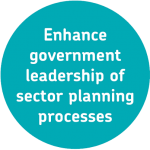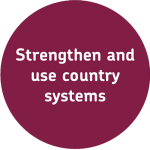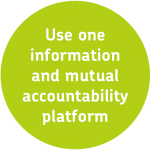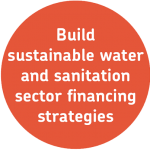SWA partners have identified Four Collaborative Behaviours that, if adopted by both countries and their partners, can improve the way that they work together to improve the long-term sector performance needed to deliver sanitation, hygiene and water for all, everywhere and forever.
SWA puts the Collaborative Behaviours at the heart of the partnership’s activities and processes. Indicators for each of the Behaviours for different countries can be found in the Country Profiles (see below). These will enable partners to track performance, and hold each other accountable for progress towards more effective, sustainable and equitable outcomes.
SWA partners agree to:
Applying the Behaviours
In applying the Collaborative Behaviours, SWA provides a platform for:
- Discussion of aid and development effectiveness, familiarizing SWA partners with concepts, terminology and good practice so that all partners have the confidence to improve the efficiency, effectiveness and economy of domestic and aid sources of finance for WASH.
- Peer monitoring of development effectiveness, including the use of resources, to help governments and development partners better understand the situation in each country and to propose specific solutions in each case.
- Dialogue on constraints identified within partner organizations to the adoption of the behaviours.
- Encouragement and support to countries in documenting their journeys towards greater development impact and sharing experiences.
- Ultimately, achieving these Collaborative Behaviours requires changes in approach and risk taking by individual SWA partners. Commitment of stakeholders throughout the sector to do things better and differently is a critical.
The Collaborative Behaviours Country Profiles
Based on publicly available data, the Country Profiles provide an overview of how both the government and development partners are applying the Behaviours. Information regarding the government and development partners is presented side-by-side to highlight areas of success and to encourage mutual accountability. The 2018 Country Profiles are the first round of profiles for the Collaborative Behaviours and they may be further refined moving forward.
The World Health Organization (WHO), through the UN-Water Global Analysis and Assessment of Sanitation and Drinking-Water (GLAAS), led the monitoring of the Behaviours in 2016-2017.
These country profiles have been produced by SWA partners, including representatives from countries, external support agencies (including donors and multi-lateral organizations), civil society, and research and learning institutions.
Download brochure How to use the Collaborative Behaviours Country Profiles.
Documents
View all Key documents| Key documents | Type |
|---|---|
| Zimbabwe - Collaborative Behaviour Country Profile 2020 | |
| Zambia - Collaborative Behaviour Country Profile 2020 | |
| Viet Nam - Collaborative Behaviour Country Profile 2020 | |
| Uganda - Collaborative Behaviour Country Profile 2020 | |
| Togo - Collaborative Behaviour Country Profile 2020 | |
| Timor Leste - Collaborative Behaviour Country Profile 2020 | |
| The Gambia - Collaborative Behaviour Country Profile 2020 | |
| Tanzania - Collaborative Behaviour Country Profile 2020 | |
| Swasiland - Collaborative Behaviour Country Profile 2020 | |
| Sudan - Collaborative Behaviour Country Profile 2020 |



